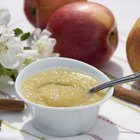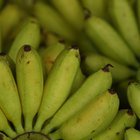
Bogdanhoda/iStock/Getty Images
When you’re biting down on a juicy red apple, the polyphenol content of your apple may be the last thing on your mind. Polyphenols, substances found in plants that are also called secondary plant metabolites, can fall into one of two categories: flavonoids and non-flavonoids. Polyphenols in apples may convey a number of health benefits, especially if you eat your apple with the skin on.
Types of Polyphenols
Apples supply around 22 percent of the total phenols eaten each year in the United States, according to Silvina Lotito, Ph.D., of the Linus Pauling Institute. The polyphenols found in apples include quercetin glycoside, phloretin glycoside, chlorogenic acid and epicatechin. Different types of apples vary in their polyphenol content. Baby food applesauce has high levels of quercetin because the peel is ground into the applesauce, while adult applesauce is made from peeled apples. Many of the nutrients in apples are found very close to the skin, so peeling removes them.
Benefits
The benefits of polyphenols found in apples include antioxidant activity, which reduces the number of free radicals, molecules that cause cell damage and that may cause cancer, heart disease and other chronic illnesses. Polyphenols may also increase immune responses, detoxify cancer-causing agents, repair cell damage and kill cancer cells.
Variety Differences
Different apple varieties have different amounts of antioxidant activity, according to Cornell University chemist Chang Lee of the New York State Agricultural Experiment Station. Varieties such as Northern Spy, Liberty, Crispin, Delicious and Fuji have high antioxidant activity, while Idared, Jonagold, Gala, Freedom, and McIntosh apples have medium activity. Empire, Ginger Gold, NY674 and Golden Delicious apple varieties have relatively low antioxidant activity. When the Linus Pauling Institute tested Red Delicious, Granny Smith, and Fuji apples for antioxidant activity on human plasma in the laboratory, Red Delicious apples, in particular, had high concentrations of antioxidants.
Studies
In clinical studies, apple polyphenols have shown interesting benefits. A study conducted by researchers from the Wakayama Medical Center and published in the 2006 “Journal of Investigational Allergology and Clinical Immunology” found that apple polyphenols improved persistent allergic rhinitis in a dose-dependent manner, with people who consumed higher levels of apple polyphenols having a larger decrease in symptoms. A 12-week study conducted by the Fundamental Research Laboratory in Japan published in the 2007 “Journal of Oleo Science” found that apple polyphenols reduced total cholesterol and low-density lipoprotein, the “bad” from of cholesterol, more than hop bract polyphenols in capsules in overweight subjects. Visceral fat also decreased more in the apple polyphenol group
Related Articles

Why Is an Apple Good for You?

Information About the Orange Fruit

How to Freeze Apples With Lemon Juice

Different Types of Fruits & Vegetables
Calories in a Jazz Apple

Fuji Apples Health Benefits

Nutrition Information on Blueberries

Can You Substitute Applesauce for Eggs ...

Are There Health Benefits of Applesauce ...

Why Does Lemon Juice Stop Apples From ...

Can Apples Promote Hair Growth?

What Fruit Has the Most Fiber?

What Foods Provide Calcium D-Glucarate?

Are Red Plums Good for You?

Foods From Rainforest Plants

Difference in Sugar Content of Sweet ...

The Best Way to Peel Pears

List of Tropical Fruits

Which Nuts Are Alkaline Forming?

Which Vegetables Produce the Most ...
References
- Linus Pauling Institute; Why Apples are Healthful; Silvina Lotito, Ph.D.
- United States Department of Agriculture; Phytonutrient FAQs; April 2005
- "Journal of Oleo Science"; Apple Polyphenols Influence Cholesterol Metabolism in Healthy Subjects with Relatively High Body Mass Index; Y. Nagasako-Akazome, et al.; 2007
- “Journal of Investigational Allergology Clinical Immunology”; Clinical Effects of Apple Polyphenols on Persistent Allergic Rhinitis: A Randomized Double-Blind Placebo-Controlled Parallel Arm Study; T. Enomoto, et al.; 2006 ;
Writer Bio
A registered nurse with more than 25 years of experience in oncology, labor/delivery, neonatal intensive care, infertility and ophthalmology, Sharon Perkins has also coauthored and edited numerous health books for the Wiley "Dummies" series. Perkins also has extensive experience working in home health with medically fragile pediatric patients.
Photo Credits
Bogdanhoda/iStock/Getty Images